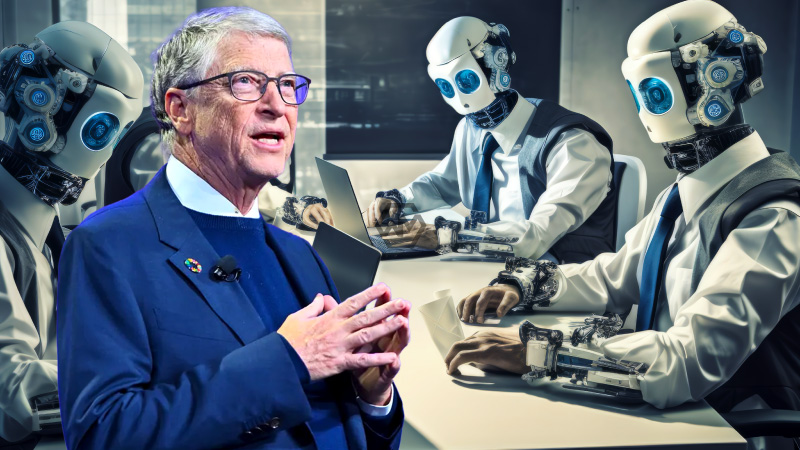- Bill Gates envisions a future where AI leads to a reduced workweek, possibly as short as two to three days.
- He emphasizes that AI could address global challenges like healthcare and mental health shortages.
- Gates sees AI as essential in solving issues such as climate change and disease eradication. Particularly, he highlights innovations in green technologies.
Bill Gates predicts that within a decade, the integration of AI into everyday work could lead to a dramatic reduction in the workweek. He envisions a future where many tasks currently handled by humans are automated. This is especially relevant in sectors like healthcare and education.
While Gates remains optimistic about the potential of AI to transform global industries, he also warns of challenges. Despite AI’s promises in fields like disease eradication and green technology, achieving these benefits globally may not be linear
AI’s Potential to Revolutionize Work: Bill Gates’ Vision of a Shorter Workweek
Bill Gates’ prediction of a two-day workweek in the future is tied to the rapid advancements in AI technology. He believes many tasks humans currently handle, particularly in specialized fields like healthcare, will be taken over by AI within the next decade. Gates imagines a world where artificial intelligence can provide expert-level services that are now scarce, like doctors and therapists. This would greatly reduce the demand for human labor in certain areas.
The Microsoft co-founder’s vision isn’t just about reducing working hours but also tackling global challenges. Gates points out that AI has the potential to address pressing issues such as the shortage of healthcare professionals and mental health specialists. These are a major concern worldwide. The reduction in human labor due to automation would, in his view, make these critical services more affordable and accessible to a broader population.
In his discussion, Gates also touches on the role of AI in the fight against diseases like Alzheimer’s, malaria, and HIV. He expressed hope that within the next few years, diseases like polio could be eradicated with the help of AI and other technological innovations. The advances in these fields, combined with AI’s potential, could vastly improve the quality of life for people worldwide.
At the same time, Gates highlights the need for careful planning regarding the environmental impact of future technologies. He is optimistic that affordable green technologies could emerge as innovations progress. However, he acknowledges that making these products universally affordable and appealing will be a major challenge. Gates remains hopeful, however, that breakthroughs will come, driven by a combination of AI and global collaboration.
In sum, Bill Gates’ vision for the future is one where AI reshapes how we live and work. This will lead to shorter workweeks and solutions to pressing global challenges. The transition will require careful navigation. Yet, the possibilities are transformative.
“The era we’re entering is one where intelligence is rare… With AI, over the next decade, that will become free and commonplace.” – Bill Gates



